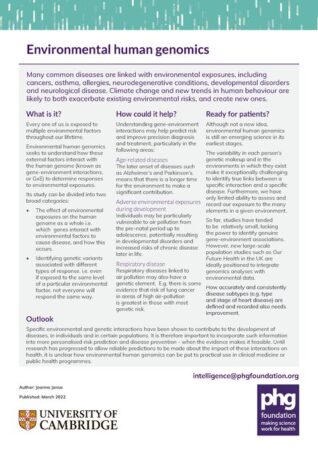Environmental human genomics looks at climate and other related environmental factors and how they interact with the human genome to influence people’s health.
Many common diseases are linked with environmental exposures, including cancers, asthma, allergies, neurodegenerative conditions, developmental disorders and neurological disease. Climate change and new trends in human behaviour are likely to both exacerbate existing environmental risks, and create new ones.
Our work examines the latest research, particularly research into genetic susceptibility to heat-related conditions. This includes understanding the scientific basis and ethical and societal implications of this information and analysing the evidence to inform discussion on the significance of this area for public healthcare.
Why it matters
Climate change is likely to create new environmental health risks, and exacerbate current ones. The analysis of environmental human genomics could help governments to understand population risk and plan accordingly.
Research is still in its early stages but this is a topic that will grow in relevance as we see increasing impact of the changing environment on human health. At the PHG Foundation, we are working to understand how human genetic factors could influence people’s responses to hotter environments caused by climate change and the impact this will have on health.
The big picture for environmental human genomics
In this programme we will also be touching on a range of issues that haven’t previously been explored:
- Genome wide environmental interaction studies (GWEIS), the current best practice and limitations when using this to inform environmental human genomics research
- The feasibility of acquiring sufficient environmental data to inform large-scale research
- The utility of novel climate change related research
- The environmental costs of this type of research and its application on a population-level scale
If you would like to know more about this project, please contact Laura Blackburn


